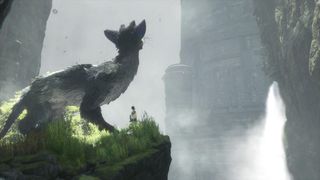The Last Guardian finds original ways to evoke player emotion

SPOILERS FOR THE LAST GUARDIAN FOLLOW
From the moment it begins, The Last Guardian knows what the player is expecting. As an adventure focused on the bond between a boy and an animal who grow to need each other, the relationship at the game’s core plays on the assumptions that it all ends in a main character’s demise, assumptions brought about by similar stories like Old Yeller, Marley and Me, Fable 2 etc. While the loss of either the boy or Trico would likely have been devastating after hours of watching them grow to care for one another, it turns out neither of them meet their end. However, the game still leads to an ending that emotionally concludes the bond I watched them create without me having to mourn their loss. An ending that subverts the expectation of death feels more bold and memorable than the actual killing of Trico or the boy might have done.
The Last Guardian is tacitly aware the player has been trained to be fearful for Trico and the boy, as it constantly toys with the idea that these two could be killed off. Up to the end, Trico gets into physical altercations with other members of his species that are so brutal and barbaric, the fact that he manages to walk away with his life is nothing short of remarkable. As this is happening, the boy seems to be slowly succumbing to an illness related to his exposure to Trico. The Last Guardian plants seeds in the player’s mind, alluding that its ending will be tragic, where all the struggles the two have overcome together will be at the expense of at least one of their lives.
But The Last Guardian instead opts to end its story with Trico saving the boy and returning him to his village where his illness is treated. However, Trico must flee to safety as his presence is perceived as a threat by the other villagers. The Last Guardian spends its runtime showing these two needed each other to survive, only to separate them because their being together has suddenly become a danger to each other. They make the devastating decision to part company because it’s what’s best for them, but they leave each other’s lives changed. In the end, it was knowing that the two were separated, not by something as inevitable and impersonal as death, but because of their love for one another that I found myself a weeping mess when the credits were rolling.

As we grow to care for characters, and in the case of a story like The Last Guardian, watch characters grow to care for one another, it’s only natural that attachment also comes with a fear of loss. When the stakes are high, we as players are always looking for the ways to get the best endings and outcomes so we don’t have to experience that feeling of powerlessness that comes with the death of a character we’ve come to know and love. Writers know this, and as years have gone by it’s become an easy way to blunt-force an emotional response in players. To take that sense of control away and make us watch a character’s death that we’re helpless to stop is an easy way to make sure your story and the people who it revolves around stick with the player when the game is over.
Death can have great weight, and games have covered a wide spectrum of ways it can add to the drama of any tale. Dom’s death in Gears of War 3 is one of sacrifice as he attempts to save other members of his squad. Henry commits suicide out of grief in The Last of Us because he can’t take the passing of his brother. You can look at most villains and see a sense of justice for their wrongdoing in their demise. But ultimately, death is an inescapable force of nature. Every character we ever meet will experience it eventually, and that universal truth is what makes stories that use death constantly more impersonal than stories that don’t. Death is the easy way to wrap up a story. It's final, and it can elicit a player's grief, but it is also a fact of life dictating that someone's story must come to an end, even if it hasn't reached a sense of closure. In some cases it's senseless, and a good character can be relegated to a pawn wasted on forcing an emotional response. The Last Guardian could have easily taken the simple route to moving its players by tapping into this ubiquitous fear of loss, but instead it spotlights the relationship at its core. It implores you to understand the love the boy and Trico have for one another rather than sympathize with one of them as they mourn the other.
We live in a time where our favorite character’s death has become our greatest fear, one several writers across different mediums are more than happy to exploit. But The Last Guardian’s conclusion shows that if you subvert what people might expect, your characters can reach a fate that is more memorable and stirring than seeing them die could ever be.
Sign up to the GamesRadar+ Newsletter
Weekly digests, tales from the communities you love, and more

Stellar Blade director "grew up too poor to afford" a PS1, but when he finally got one in college, Ridge Racer and Final Fantasy inspired him to make games

Oh, that's why the Stellar Blade devs were terrified by demo players: one fan's spent "about 60 hours" maxing Eve's skill tree before the action RPG is even out
Most Popular



